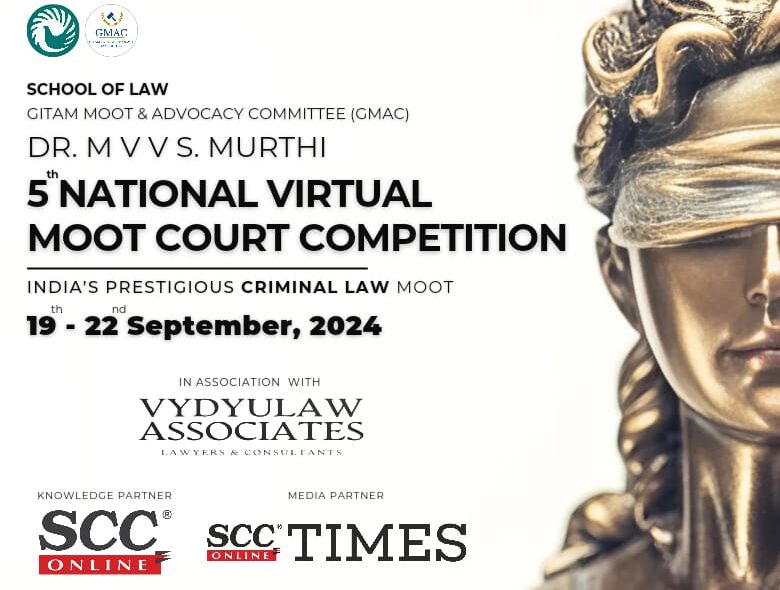Dr. M. V. V. S. Murthi 5th National Virtual Moot Court Competition, 2024 Organised by GITAM School of Law, Visakhapatnam.
The GITAM Moot and Advocacy Committee (GMAC) of the GITAM School of Law is conducting the Dr. M.V.V.S. 5th National Virtual Moot Court Competition, 2024, from 19th to 22nd of September 2024. GMAC was set up in 2019 as a remarkable wing of the GITAM School of Law, dedicated to providing comprehensive advocacy training to students and honing their argumentative skills. GITAM School of Law successfully organized the National Moot Court Competition on Space Law in 2020, the 2nd National Virtual Moot Court Competition in 2021 on Arbitration, the 3rd National Virtual Moot Court Competition in 2022 on Tech Law, and the 4th National Virtual Moot Court Competition in 2023, on Intellectual Property Rights and Right to Privacy.
This year, GMAC is back with the 5th edition of Dr. M.V.VS. Murthi National Virtual Moot Court Competition, from 19th-22nd September 2024, on Criminal Laws with regard to Anti-Corruption.
The GMAC team is excited to have you and will keep you in the loop throughout the event!!
Schedule of the Competition:
19th September, 2024 (Day-1) – Inaugural Ceremony and Researcher’s Test.
20th September, 2024 (Day-2) – Preliminary Rounds- Session 1 & 2.
21st September, 2024 (Day-3) – Quarter Finals and Semi-Finals.
22nd September, 2024 (Day-4) – Finals and Valedictory Ceremony.
DAY 1! ______________________________________________________________
19th September 2024 ___________________________________________________
INAUGURAL CEREMONY ________________________________________________
11:00 AM: The inaugural ceremony session has been initiated by Asst. Prof. GITAM School of Law, Ms. Usha Amulya, (Faculty Coordinator, GMAC).
11:04 AM: Prayer led by Tarun Teja, a final-year B.B.A. LL.B Student, a committee member of GMAC.
11:08 AM: The welcome note is given by the Director and Dean of GITAM School of Law Prof. Dr. Anita Rao Ma’am, she has given a brief about the necessity of Moot Court Competitions for Law Students. She encouraged the participants and emphasized the crucial role moot court plays in shaping their professional law journey. She also discussed how the legal system functions to protect the nation and its citizens from corruption, which exists across various sectors. She highlighted the significance of the Anti-Corruption Bureau and encouraged participants to approach this journey with enthusiasm, showcasing their skills and knowledge.
11:20 AM: The session’s Guest of Honor, Shri. Prof. Y. Gouthama Rao, the Vice-Chancellor (In-charge), GITAM (Deemed to be University), Visakhapatnam, addressed the session and touched upon several key aspects. He emphasized the significance of the Moot Court Competitions as a valuable practice in courtroom scenarios. Additionally, he shed light on the theme of the competition, Anti- corruption. He also discussed other social issues and the responsibility of lawyers and legal students in addressing them. Encouraging participation, he reminded students that the experience gained is more important than winning or losing. He concluded by wishing all participants success in the competition.
11:22 AM: Sai Ram Vinay, a final-year B.A.LL.B. student and a committee member of GMAC, introduced the Chief Guest Hon’ble Justice Jasti Chelameswar, Former Judge, Supreme Court of India, highlighting his significant contributions as sitting judge of the Supreme Court. He also presented various landmark judgments delivered by the chief guest, showcasing their profound impact on the legal landscape.
11:25 AM: The distinguished Chief Guest, Hon’ble Justice Jasti Chelameswar, Former Judge, Supreme Court of India, delivered an insightful talk on criminal law and his professional life before being appointed as a judicial officer. He expressed his appreciation towards all the younger generation for being supportive at the time of his tenure as a judge. Further, he mentioned the association with GITAM School of Law.
11:50 AM: The session’s Guest of Honor, Y. Ravindra Prasad, Former President of the Visakhapatnam Bar Association, discussed the Shreya Singhal case and the Haryana Panchayat Law, praising Justice Chelameshwar for his stance on these matters. He highlighted the significance of the Raj Bala v. State of Haryana judgment and noted that the chief guest had provided valuable insights on this case, where he served as a judge on the bench. He congratulated GITAM School of Law for coming up with a moot proposition related to the Prevention of Corruption Act, highlighting some of its key aspects. He explained how the Moot competition will enhance participants’ honing their argumentative skills, allowing them to delve deeply into the scenario, analyze it thoroughly, and conduct comprehensive investigations.
11:52 AM: Asst. Prof. GITAM School of Law, Ms. Usha Amulya conveyed a heartfelt vote of thanks to all the esteemed dignitaries and the participants from renowned law schools across the country. She expressed gratitude towards the Director and Dean of GITAM School of Law for her support throughout the session. Additionally, Ms. Usha extended her appreciation to the GITAM University management, the faculty of the GITAM School of Law, and the dedicated GMAC Committee for their meticulous efforts in organizing this event.
11:58 AM: Asst. Prof. Mr Ashish briefed about the Rules of the Competition to the participants.
12:19 PM: Asst. Prof. Dr. Kiran has virtually drawn the lots to match up the teams!
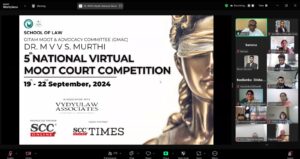
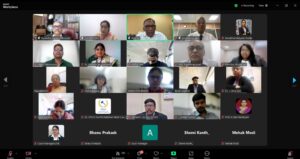
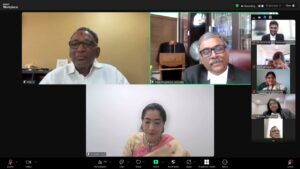
With the successful closure of Day 1, we now eagerly look forward to commencing Day 2!
DAY 2! _____________________________________________________________
20th September 2024 __________________________________________________
PRELIMINARY ROUNDS – SESSION 1 _______________________________________
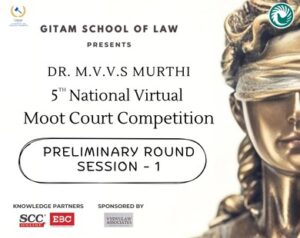
10:00 AM: As the curtain rises on the forthcoming preliminary rounds, we are set to delve into the compelling realms of Criminal Law and Anti-Corruption, exploring intricate legal nuances and thought provoking arguments!!
10: 02 AM: All teams are thoroughly prepared and filled with enthusiasm as they eagerly anticipate the unfolding of the day’s events.
10:04 AM: All courtrooms have officially commenced proceedings.
10: 08 AM: In Court Room 8, the session commenced with the court manager providing instructions, followed by each team specifying their allotted time for arguments.
10: 10 AM: In Court Room 1, the session has commenced.
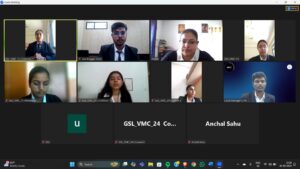
10:14 AM: In Court Room 10, the proceedings have begun.
10: 15 AM: In Court Room 8, Team GSL_VMC_14 (Speaker 1) is presenting her arguments with great confidence and determination.
10: 17 AM: In Court Rooms 4 4, 7 , 11, and 13, the proceedings have begun.
10: 19 AM: In Court Room 6, the proceedings have begun GSL_VMC_06 is presenting arguments.
10: 19 AM: In Court Room 7, team GSL_VMC_07 started the proceedings with Statement of Facts.
10: 23 AM: In Court Room 13, teams GSL_VMC_13 and GSL_VMC_24 are present. The judge requested the counsels (petitioners) to clarify the issue of jurisdiction before proceeding with the relevant matter.
10: 24 AM: In Court Room 8, GSL_VMC_14 (Speaker 2), started with issue no. 3 stating whether the prosecution had proved beyond reasonable doubt that the appellant has done an act punishable under Section 7 7 Prevention of Corruption Act, 1988.
10: 26 AM: In Court Room 6, GSL_VMC_06 (Speaker 1) has started with Facts and arguments for issue no. 1 with relevant case laws.
10: 26 AM: In Court Room 1, the judge asked GSL_VMC_11 (Speaker 1) to check the first page of their compendium.
10: 26 AM: In Court Room 7, the judge asked GSL_VMC_07 (Speaker 1) that just because a person is carrying the duties of private nature will he be disqualified as a public servant.
10: 27 AM: In Court Room 11, GSL_VMC_05 have started their arguments.
10: 27 AM: In Court Room 2, 3 and 15, the session began and arguments have started.
10: 28 AM: In Court Room 6, GSL_VMC_06 have started with their arguments for issue no. 2 with relevant case laws.
10: 29 AM: In Court Room 1, the judge asked to increase the time limit for GSL_VMC_11 (Speaker 1) by 3 minutes.
10: 29 AM: In Court Room 13, the judges have asked a question regarding whether the officer in question is a public servant or not and further the judge asked the counsel to clarify on the issue.
10: 30 AM: In Court Room 11, the Judge asked the GSL_VMC_05 about the definition of a Public Servant.
10: 30 AM: In Court Room 3, the judge questioned GSL_VMC_26 about the definition of a Public Servant and questions related to it.
10: 31 AM: In court Room 7, the judge questioned GSL_VMC_07 whether the issue in the present case would fall under vicarious liability.
10: 34 AM: In Court Room 3, the judge questioned GSL_VMC_26 about the purpose of the Prevention of Corruption Act, 1988 involved in the moot proposition.
10: 35 AM: In Court Room 5, the judge questioned GSL_VMC_23 about the grounds on which they are arguing.
10: 36 AM: In Court Room 6, the judge questioned GSL_VMC_06 about the difference between Section 2 (c) (1) and 2 (c) (8) of the Prevention of Corruption Act, 1988.
10: 37 AM: In Court Room 8, GSL_VMC_14 (Speaker 2), asked for additional 1 minute from the judges to close their arguments to which the judges consented.
10: 38 AM: In Court Room 13, GSL_VMC_13 (Speaker 2) mentioned the issue of sanctions and how this should be implemented. Further the judge asked questions related to it.
10: 40 AM: In Court Room 12, GSL_VMC_09 the judge, questioned (Speaker 1) whether the Public Servant can go beyond his duty and take bribe.
10: 41 AM: In Court Room 7, GSL_VMC_15 (Speaker 2) have started with issue 3 and 4, Issue 4 specifies that prosecution has failed to prove beyond reasonable doubt about the offer and acceptance of the bribe.
10: 42 AM: In Court Room 3, the judge asked GSL_VMC_16 (Speaker 1) whether they can cite any case to confirm that the court does not have any jurisdiction to hear the matter.
10: 44 AM: In Court Room 13, GSL_VMC_24 (Speaker 2) started with the 3rd issue. And tried to prove why the accused is not guilty with the relevant case law and legal provisions.
10: 45 AM: In Court Room 10, GSL_VMC_15, the judge questioned (Speaker 2) to explain the term bribery in simple terms.
10: 46 AM: In Court Room 07, GSL_VMC_07, (Speaker 2) has raised the issue of Right to Privacy for the trap proceeding, citing the authority from the landmark case of KS Puttaswamy v. Union of India.
10:47 AM: In Court Room 15, GSL_VMC_27, the judge questioned whether the terms Bribery and Corruption fall under the same definition.
10: 48 AM: In Court Room 5, the judge questioned GSL_VMC_23 to point out the loopholes in the procedure to support their issues.
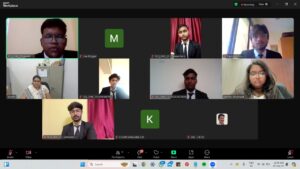
10: 49 AM: In Court Room 13, the judge questioned GSL_VMC_24 what is the legality of Sting Operation in their country, and why are they using the term trap instead of Sting operation?
10: 51 AM: In Court Room 12, the judges questioned GSL_VMC_09 on their 3rd issue about whether the AO is liable for taking bribe, and the judges were not convinced with their arguments.
10: 55 AM: In Court Room 5, GS_VMC_23 started with their 4th Issue on using the test as part of Sting Operation and their lapses, which could render evidence unacceptable.
10: 56 AM: In Court Room 13, GSL_VMC_24 (Speaker 1), invoked Article 226 regarding the jurisdiction. The judge questioned whether this was a Writ? And further, the judge questioned under which Act VRO is defined?
10: 58 AM: In Court Room 11, GSL_VMC_01 (Speaker 1) dealt with 3rd Issue and argued about the actual meaning of sanction and its importance in the Indian Legal System. And supported the arguments by citing Mahesh Prasad vs. State of UP.
11: 00 AM: In Court Room 10, the judge questioned GSL_VMC_18 whether the prosecution of AO is Valid?
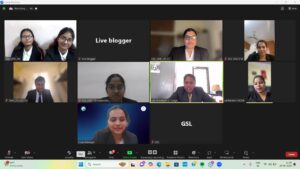
11: 02 AM: In Court Room 12, GSL_VMC_08 (Speaker 1) requested the judges for extension of 1 minute the Speaker was asked to sum up the arguments, and further, the judge questioned whether PW4 and PW5 are independent witnesses.
11: 05 AM: In Court Room 13, GSL_VMC_24 (Speaker 1) the respondents put forth their arguments procing that the VRO is a Public Servant using various Statutes, Regulations and Case Laws. And also, how the VRO draws his salary. The judge questioned as to why only the VRO is being prosecuted and not other officials as there could be larger conspiracy.
11: 10 AM: In Court Room 14, GSL_VMC_25 clarified on the responsibility of Patidar citing the case law D Venkat Raman vs. State of AP. And also, clarified on the constitutionality, admissibility and the validity of a Sting operation, citing the case law Kudeep Singh vs. State of Punjab.
11: 12 AM: In court Room 01, GSL_VMC_02 (speaker 2) Judge asked to provide a clear and comprehensive explanation of the key elements under section 13 (1)(b) of the Prevention of Corruption Act, 1988.
11: 18 AM: In Court Room 11, GSL_VMC_05 started with a rebuttal round and pointed out that the Respondents GSL_VMC_01, have misinterpreted the facts to give it more technical aspects. They also pointed out that PW4 the Kamal Khanna has a very questionable nature, so they cannot believe his statement.
11: 20 AM: In Court Room 2, the judge questioned GSL_VMC_22, what do you mean by phenoptyl test was the question asked by judge and is conducting a sting operation legal or not, to which the speaker said it is legal and then the judge asked for any precedents that claim that the sting operation is legal or not and then due to no answer from the respondent side, it was discharged.
11: 24 AM: In Court Room 15, GSL_VMC_32 (Speaker 2) the judge questioned whether the forensic evidence was enough to prove that AO has taken the bribe.
11: 28 AM: In Court Rooms 3, 10, and 12, started with the rebuttal.
11: 32 AM: In Court Rooms 6 and 13, the proceedings are completed.
11: 37 AM: In all the Court Rooms the rebuttal and Sur-rebuttal rounds were concluded. And the feedback was given.
We have now concluded the first session of the preliminary rounds!!
PRELIMINARY ROUNDS – SESSION 2 ________________________________________
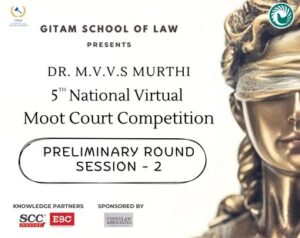
2:00 PM: All participants are now fully prepared to compete against each other in the second session of the preliminary rounds.
2:04 PM: The formal proceedings in each courtroom have now officially commenced.
2:10 PM: In Court Room 13, GSL_VMC_ 26 (Speaker- 1) went ahead with the jurisdiction and the issues involved. The judge questioned the writ jurisdiction and whether any alternative remedy exists ? The petitioners were furthur asked why a writ remedy was chosen instead of a remedy under the Prevention of Corruption Act.
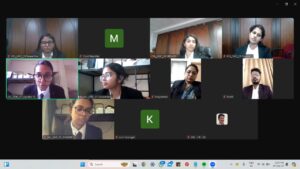
2:12 PM: In Court Room 12, GSL_VMC_22 (Speaker-1) proceeded with the facts of the case in brief, the judge has interrupted to mention the Section 17(c) of the Prevention of Corruption Act, 1998.
2:16 PM: In Court room 05 GSL_VMC_32 (Speaker:1) stated that the petitioner is not holding any office under government. To that statement, the judge questioned the designation of the petitioner and how do you prove that he is whether a public servant or not?
2:16 PM: In Court Room 4 GSL_VMC_ 31 Appellant (speaker 1) proceeded with brief facts and then with the arguments. Judge questioned that under Motor Vehicle Act only sub inspector can charge challan, what if an officer below the rank of SI issues challan does it amount to corruption, and cautioned the counsel not to argue without relevant references.
2: 17PM: In Court Room 03 GSL_VMC_24 (Speaker- 1) the petitioner started with her first issue of whether the appellant is a public servant or not under section 2(c) of the Prevention of Corruption Act, 1988.
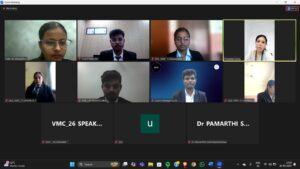
2: 18 PM: In Court Room 12 GSL_VMC_22 the judge has questioned the (Speaker 1) to mention what is string operation as per this case.
2: 20 PM: In Court Room 03 GSL_VMC_24 the judge questioned the (Speaker 1), Who is a VRO and what are his function as a government employee?
2: 22 PM: In Court Room 12 GSL_VMC_22 judge has questioned (Speaker 1) to mention all the sections relevant to this case, later asked where did the bribe took place, accordingly the speaker has replied.
2: 23 PM: In Court Room 05 GSL_VMC_32 judge asked the (Speaker 2) to explain the concept of “beyond reasonable doubt”.
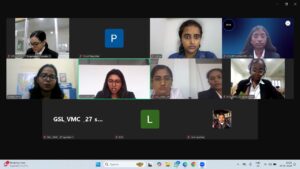
2: 25 PM: In Court Room 4 GSL_VMC_ 31, The judge questioned how the operation conducted by the Anti Corruption Bureau is unauthorized, to which the speaker again cited reasons without any relevant reference and concluded.
2: 25 PM: In Court Room 15 GSL_VMC_29 the judge questioned (Speaker 1) whether the act done by the accused was a bailable offence or non bailable, similarly cognizable or non cognizable offence and whether the accused was given an opportunity to represent himself in the court.
2: 25 PM: In Court Room 11 GSL_VMC_02 The judge questioned to the (Speaker 1) – under the prevention of corruption act how is the term public servant defined?
2: 26 PM: In Court Room 06 GSL_VMC_3 the Judge questioned the (Speaker 1) what is the importance of sanction in criminal law?
2: 26 PM: In Court Room 13 GSL_VMC_ 26 (Speaker 1) went ahead with the arguments about whether the AO is a public servant or not; the Counsel further clarified their stand that the accused did not take or demand a bribe and that the sting operation was a trap. The judge pointed out a contradictory judgement cited by the petitioner, mentioning that the sanction can be flexible. The (Speaker 1) concluded arguments for issues 1 and 2.
2:28 PM: In Court Room 7 GSL_VMC _4 (Speaker 2) is discussing the procedural irregularities and the honourable judge asked for the justification of trap proceedings.
2: 32 PM: In Court Room 03 GSL_VMC_24 the (Speaker 2) Stated about the doctrine of procedural compliance, stating that no proof of AO acting in his actual capacity was found and that the sting operation was not fair. T
2: 33 PM: In Court Room 15 GSL_VMC_29 the judges questioned (Speaker 2) what procedure has to be followed during a sting operation.
2: 34 PM: In Court Room 4 GSL_VMC_ 31 (Speaker 2) dealt with the further issues, judge reprimanded the counsel to dismiss the petition for stating wrong name of the parties.
2: 35 PM: In Court Room 7 GSL_VMC_4( petitioners ) the judge questioned the (Speaker 2) petitioners whether 1 single incident of corruption can be sufficient for conviction under section 13(1)(b)of corruption eradication Act for which the judge was not satisfied with the justification given by the petitioners.
2: 35 PM: In Court Room 01 GSL_VMC_01 (Speaker 2) clarified the distinction between “accept” and “obtain,” arguing that Section 7 of the Eradication of Corruption Act doesn’t apply to these terms. The judge sought clarification on Section 7’s key elements, concluding that it does apply given the circumstances. (Speaker 2) asserted that the father and son lodged a false complaint based on the unique ID number recorded.
2: 38 PM: In Court room 8 GSL_VMC_10 (Speaker 1) dealt with the issue n0. 1 and 3 and given the brief fact of the case. And the (Speaker 2) dealt with the issue number 2 and 4 . The question raised by the if a person getting money from application it is bribery only. Who collected the money?
2: 40 PM: In Court Room 3 GSL_VMC_24 the (Speaker 2) contended that the bribe taken by the AO was not intentional. The judge further asked her that how can you ascertain the intention of a bribe being taken by the AO.
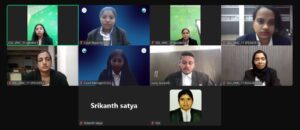
2: 42 PM: In Court Room 7 GSL_VMC_4 (Speaker 2) Petitioners have prayed the judge for allowing the appeal to the Highcourt and appellants have concluded their arguments.
2: 45 PM: In Court Room 13 GSL_VMC_ 26 (Speaker 2) started with issues 3 and 4; the judge pointed out a mistake in the cause title. The counsel argued that the offence was not proved beyond reasonable doubt.
2: 48 PM: In Court Room 9 GSL_VMC_12 the judge asked (Speaker 2) the meaning of the word trap used by s2 while describing the sting operation. And asked in which case or judgment there was a use of the word trap for a sting operation.
2: 50 PM: In Court Room 4 GSL_VMC_ 31 There was a clerical error in the prayer of the petition, and even proper reliefs were not sought by the counsel.
2: 52 PM: In Court Room 03 GSL_VMC_24, the judge questioned the (Speaker 2) about the appellant jurisdiction of the court and the consequences that could be given by an appellant court. The judge further noticed certain clerical mistakes in the memorial given by the team and that they’ve used contradictory arguments in the memorial regarding the issue of public servant.
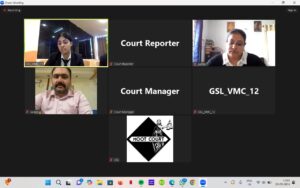
2: 55 PM: In Court Room 11 GSL_VMC_05 the judge has asked questions (Speaker 1) how the prosecution ensures to compile the section 19 of prevention of corruption act ?
2: 58 PM: In Court Room 13 GSL_VMC_ 13, The judge sought clarification for sanction, and whether it was properly obtained and was granted by which authority; later, with the help of case laws , the counsel concluded her arguments.
3: 00 PM: In Court Room 2 GSL_VMC_07, The judges raised a question that in a bribe, both the parties; ie the giver and taker both shall be responsible? and council seeks for an extension,
3: 04 PM: In Court Room 07 GSL_VMC_15 and VMC-4, Both the teams have started with their rebuttals.
3: 06 PM: In Court Room 9 GSL_VMC_17, the judges questioned (Speaker 1) the relevance of the cases mentioned in relation to the facts of the case.
3: 08 PM: In Court Room 2 GSL_VMC_07 (Speaker 2) the respondents have recited their prayer and 10 min rebuttal round has begun with 5 min each.
3: 10 PM: In Court Room 07 GSL_VMC_15 and VMC 4 proceedings have concluded.

3: 12 PM: In Court Room 10 GSL_VMC_ 23 (Speaker 2) respondent stated that it was established beyond the reasonable doubt that the AO is punishable.
3: 15 PM: Court Room 13 GSL_VMC_ 13, (Speaker 2) The counsel argued that the sting operation was done without malafide intention; the counsel put forward a few case laws on the same issue. The counsel further pointed out the various elements of proving the offence.
3: 20 PM: Court Room 5 GSL_VMC_30, Judge asked questioned about the admissibility of prosecution witnesses?
3: 22PM: Court Room 03 GSL_VMC_14, the judge questioned the (Speaker 2) to state arguments to proof their contention that the money was tainted and the meaning of tainted money.
3: 22 PM: Court Room 13 GSL_VMC_ 13 (Speaker 1) concluded with her arguments and prayer . The judge initiated the rebuttal round for both the sides.
3: 30 PM: In Court Rooms 4 and 15, proceedings concluded.
We now arrive at the end of session 2 of the preliminary rounds!!
After a rigorous day of preliminary rounds, we are pleased to announce the teams that have successfully advanced to the Quarter-Finals.

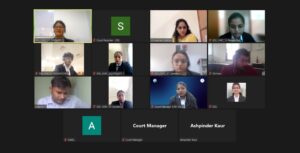
10: 38 AM: In Court Room 4 GSL_VMC_31 both the speakers continues to argue on the evidence that has been obtained with unconstitutional method and questions the integrity of our legal system.
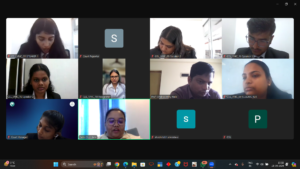
Judge questions if principles of natural justice have to be followed in all the cases.
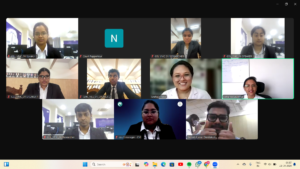
11: 50 AM: In Court Room 01 GSL_VMC_06, The averment made by the respondents that a machine was used for counting the money is completely misleading.
We now arrive at the end of Quarter – Finals!!
After a highly competitive Quarter-Finals session, we are pleased to announce the teams that have successfully advanced to the Semi-Finals.
SEMI-FINALS!
TEAMS
COURT ROOM NO 1: GSL_VMC_06 v. GSL_VMC_09
COURT ROOM NO 2: GSL_VMC_08 v. GSL_VMC_13
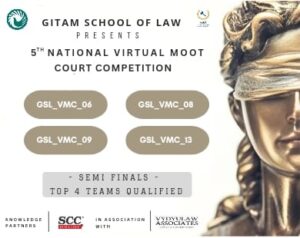
2: oo PM: Courtrooms 1 and 2 are officially in session!!
2: 05 PM: In Court Room 2 GSL_VMC_08, (Speaker 1) Summarised the facts.
2: 10 PM: In Court Room 1 GSL_VMC_06, (Speaker 1) started with the facts in brief, and emphasized on the case of Narendra Kumar vs State of UP.
2:12 PM: In Court Room 2 GSL_VMC_08, (Speaker 1) starts arguing on the issue that the AO is not the the public officer at the time of the offence. She discussed about the nature of the duty performed is more of field work and not a duty of public character to the nation. The judge questioned her statements about public servant and public service.
2: 16 PM: In Court Room 2 GSL_VMC_08 (Speaker 1) justifies her statement with Case Subramanyam vs. inspector of police stating the principle difference of what constitutes public service and who is public servant.
2: 17 PM: In Court Room 1 GSL_VMC_06, (Speaker 1) Counsel for petitioner discussed about the sub issue to issue 1 and emphasised Section 19 of the Corruption Eradication Act (Section 11, 12, 13, 15 of the Act also specified). Further, they mentioned the case of CV Balan vs. State of Kerala.
2: 20 PM: In Court Room 1 GSL_VMC_06 (Speaker 1) Counsel for petitioner started dealing with sub-issue 2 (offence of bribe ) – Speaker stated that the AO did not commit the offence under section 7 of the said Act as under the section, it is extremely difficult to establish illegal gratification thereof.
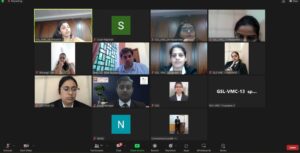
2: 39 PM: In Court Room 2 GSL_VMC_08, (Speaker 2) starts her arguments with issue 3 whether the prosecution has established beyond reasonable doubt that the AO has committed the offence.
2: 40 PM: In Court Room 1 GSL_VMC_06, (Speaker 2) mentioned the failure of the prosecution in the previous trials to establish an appropriate link with the alleged offence, and the alleged delay was to solicit the bribe, thereof and further cited the case of C. Chenga Reddy vs. State of AP.
2: 42 PM: In Court Room 1 GSL_VMC_06, (Speaker 2) Counsel cited the case of Kishan Chander vs State of Delhi (2016) concerning the conviction of a public servant under Section 13 (1) of the Act and further argued that whole reliance on the phenolphthalein test was not appropriate for the powder was found only on the left-hand fingers of the accused officer and further argued that it is not possible to count such a huge sum with left hand.
2: 50 PM: In Court Room 1 GSL_VMC_08, the judge asks to interpret the term ‘handed over’ regarding the bribe amount.
2: 52 PM: In Court Room 1 GSL_VMC_09, (Speaker 1) Counsel for the respondents emphasized the case of Anil Kumar Singh vs. the State of UP and State of Gujrat v. Mansukhbai Shah concerning the exercise of jurisdiction by the accused beyond the domain.
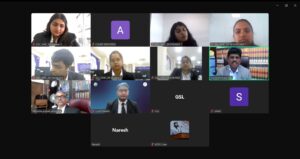
3: 04 PM: In Court Room 1 GSL_VMC_09, (Speaker 1) Counsel for Respondents (Speaker 1) mentioned the case of Rameswar vs. State of Bihar with respect to the issue of sanction.
3:09 PM: In Court Room 2 GSL_VMC_13, the judge asks to justify the allegations made on AO and the speaker replies that they have to be made with some nexus with the public servant or public duties.
3: 12 PM: In Court Room 1 GSL_VMC_09, (Speaker 2) Counsel for Respondents (Speaker 2) started dealing with issue 3 and presented an interpretation of section 7 with respect to the issue (demand and acceptance of unfair advantage). Further, the counsel highlighted Material Object No. 6.
3: 20 PM: In Court Room 1 GSL_VMC_09 (Speaker 2) Counsel for Respondents (Speaker 2) proceeded to deal with issue 4 and provided an explanation and the illustration of the statutory provision alleged against the accused officer in this issue stated and cited the case of Sanjay vs State of Maharashtra.
3: 21 PM: In Court Room 1 GSL_VMC_09, (Speaker 2) on behalf of the team, submits their prayers to the Court.
3: 24 PM: In Court Room 2 GSL_VMC_13, (Speaker 2) starts her arguments with her issue 3, i.e., whether AO is liable to be accused for the offence.
3: 25 PM: In Court Room 2 GSL_VMC_13, the judge questioned the credibility of the mediators.
3: 26 PM: In Court Room 1 GSL_VMC_06 & GSL_VMC_09, counsel for Petitioner (Speaker 1) commenced the rebuttals.
3: 30 PM: In Court Room 1 GSL_VMC_06 & GSL_VMC_09, the session concluded and judges extended their valuable feedback to the participants.
3: 40 PM: In Court Room 2 GSL_VMC_13, the judge questioned about the circumstantial evidence and asked to explain the chain of evidence in this current case.
3: 45 PM: In Court Room 2 GSL_VMC_08 & GSL_VMC_13, the session concluded.
With this, the Semi-Finals have concluded!!
With the successful conclusion of Day 3, we are now looking forward to embarking on Day 4 with renewed enthusiasm.
DAY 4!
22nd September 2024
FINALS!
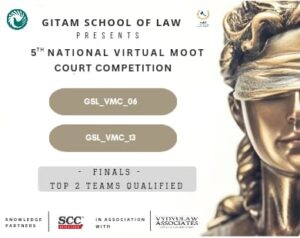
With great anticipation, we commence the final day of our event, eagerly awaiting the compelling final rounds and the grand valedictory session, which will be honored by the presence of our esteemed dignitaries.
TEAMS!
GSL_VMC_06 vs GSL_VMC_13
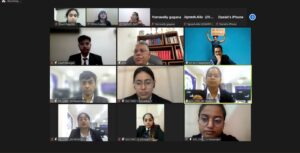
10: 04 M: The court manager initiated the proceedings by announcing the rules and clarifying the schedule and teams.
10: 05 AM: The Appellant GSL_VMC_06, ( Speaker 1) started with the arguments with the brief summary of the facts.
10: 06 AM: The Appellant GSL_VMC_06, (Speaker 1) starts with issue 1 i.e., whether the present appeal is maintainable before the Hon’ble High Court or not.
10: 08 AM: The Appellant GSL_VMC_06, (Speaker 1) tries to justify that Right to appeal is a fundamental and statutory right by citing relevant case laws.
10: 10 AM: The Appellant GSL_VMC_06, (Speaker 1) further argues that the trial court has wrongfully convicted the accused officer ignoring the fact of prior approval from authorities before arresting him.
10: 11 AM: The Appellant GSL_VMC_06 (Speaker 1) cited CV Balan vs. State of Kerala, that States about a private complaint against public servant.
10: 12 AM: The judge questioned about the validity of the case cited to (Speaker 1) GSL_VMC_06 Appellant.
10: 15 AM: The Appellant GSL_VMC_06, (Speaker 1) justifies that they have taken the Ratio decidendi of the case stating about sanction.
10: 20 AM: The Appellant GSL_VMC_06, (Speaker 1) proceeded with the issue no.2 if the accused officer will be qualified as a public officer at the time of the offence committed.
10: 28 AM: The Appellant GSL_VMC_06, (Speaker 2) continues with the issue 3 i.e., whether the sanction for prosecuting the accused officer is valid or not.
10: 31 AM: The Appellant GSL_VMC_06, (Speaker 2) proceeded with issue 4 i.e, whether the prosecution has proved beyond a reasonable doubt that the accused officer has committed the offense under the Prevention of Corruption Act, 1988.
10: 34 AM: The Appellant (Speaker 2) states about the issue of doubt regarding the impartiality and independency of the mediator.
10: 37 AM: The Appellant (Speaker 2) states about the burden of proof with respect to the offence – where the prosecution has failed to prove demand of money due to which it was wrong to arrest him without proper investigation and proof.
10: 44 AM: The Appellant (Speaker 2) explains about absence of corrupt intent and illegal means to enrichment speaker 2 explains the absence of corrupt intent and illegal means to enrichment.
10: 50 AM: The Appellant (Speaker 2) ended their submissions with the prayer to revoke the sanction against the accused officer and set aside the impugned order convicting the accused officer.
10: 52 AM: The Respondent GSL_VMC_13, (Speaker 1) proceeded with their arguments with issue 1 i.e., the accused officer is a public servant performing public duty and the transaction took place at the same time that of public service at the time of the commission of the offence.
11: 01 AM: The judge questioned about whether the sting operation is successful or not in terms of evidence against the accused officer taking the bribe.
11: 05 AM: The Respondent GSL_VMC_13, (Speaker 1) continues with the issue 2 that there was an application of mind and the sanction meets the principles of naturals of justice.
11: 06 AM: The Respondent (Speaker 1) justifies that the material evidence has been set up before the authorities for the application of mind to grant the sanction.
11: 08 AM: The judge questioned on the timeline of the granting of sanction and why there is a need for hurry without proper application of mind.
11: 10 AM: The judge questioned about the proper execution of sting operation, why the chemical powder is found only on fingertips of only one hand.
11: 14 AM:The Respondent (Speaker 2) proceeded further with arguments on issue 3 whether the offence has been proven beyond reasonable doubt.
11: 18 AM: The Respondent (Speaker 2) justifies that there was a demand for illegal gratification and acceptance of the same as well as proof of circumstantial evidence in this regard.
VALEDICTORY CEREMONY!
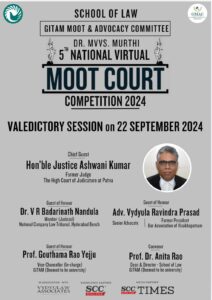
12: 54 PM: The Guest of Honor , Vydyula Ravindra Prasad, Senior Advocate and former president of Visakhapatnam Bar Association, started by thanking and welcoming the honorable guests for the sessions.
The most awaited results are out!!!…
Runner – KIIT, Bhubaneshwar – GSL_VMC_06
Best Speaker – RMLNLU
Best Researcher – HPNLU
Best Memorial – Bennett University


